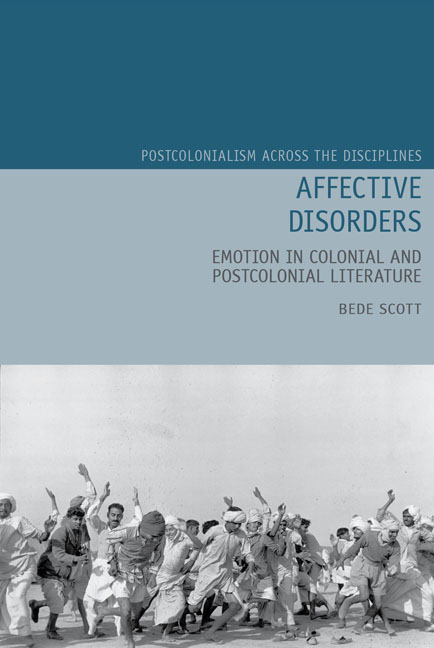Book contents
- Frontmatter
- Dedication
- Contents
- Acknowledgements
- Introduction
- 1 Anger: Naguib Mahfouz's Midaq Alley
- 2 Reticence: Vikram Seth's A Suitable Boy
- 3 Jealousy: Joaquim Maria Machado de Assis’ Dom Casmurro
- 4 Boredom: Upamanyu Chatterjee's English, August: An Indian Story
- 5 Fear: Michael Ondaatje's Anil's Ghost
- 6 Stuplimity: Vikram Chandra's Sacred Games
- Works Cited
- Index
6 - Stuplimity: Vikram Chandra's Sacred Games
- Frontmatter
- Dedication
- Contents
- Acknowledgements
- Introduction
- 1 Anger: Naguib Mahfouz's Midaq Alley
- 2 Reticence: Vikram Seth's A Suitable Boy
- 3 Jealousy: Joaquim Maria Machado de Assis’ Dom Casmurro
- 4 Boredom: Upamanyu Chatterjee's English, August: An Indian Story
- 5 Fear: Michael Ondaatje's Anil's Ghost
- 6 Stuplimity: Vikram Chandra's Sacred Games
- Works Cited
- Index
Summary
Ours is indeed an age of extremity. For we live under continual threat of two equally fearful, but seemingly opposed, destinies: unremitting banality and inconceivable terror.
Susan Sontag, ‘The Imagination of Disaster,’ 1965We were interested precisely in those things which are the opposite of the extraordinary yet … are not the ordinary either.
Paul Virilio, ‘On Georges Perec,’ 2001Although it is often described as a thriller and demonstrates many of the characteristics that we typically associate with this genre, Vikram Chandra's 2006 novel Sacred Games can, in places, be surprisingly unthrilling. For long stretches of time, nothing of any real significance transpires; and much of the narrative serves to impede, rather than facilitate, the progress of its most ‘thrilling’ plotline. It is certainly true that there is no shortage of spectacle here – whether it takes the form of a brutal gangland massacre, a terrorist bombing, or a police siege. Yet we are also exposed to the routine violence and criminality that, for many people, has become an inescapable feature of everyday life in Mumbai, the Indian city of twenty-two million that serves as the novel's primary setting. In the following pages, I would like to suggest that this conjunction of opposing categories gives rise to a dominant structure of feeling that not only influences the novel at the representational or mimetic level, where all the action takes place, but also penetrates the deeper reaches of form, genre, and style. More specifically, I shall argue that the concurrence of both spectacular and mundane forms of criminality within Sacred Games produces an affective state that is equally heterogeneous, combining the categories of the sublime and the stupefying, the astonishing and the boring. And this feeling – which I shall be describing as one of ‘stuplimity’ (Ngai, Ugly 271) – ultimately infiltrates the discourse itself, creating an unsettling slippage between the narrative's more significant episodes (or nuclei) and those that constitute mere filler.
Before we begin, though, it may be worth considering, just briefly, some other crime narratives that have sought to dissolve the boundary between the public sphere and the private, the historical event and the everyday occurrence.
- Type
- Chapter
- Information
- Affective DisordersEmotion in Colonial and Postcolonial Literature, pp. 147 - 168Publisher: Liverpool University PressPrint publication year: 2019

